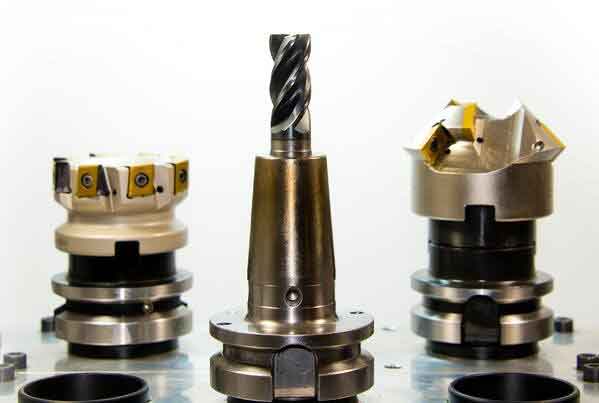Swiss screw machining is a subtractive manufacturing (i.e., machining) process that employs the use of Swiss-type machining equipment. It differs from other machining equipment in that it uses a guide bushing to minimize the distance between the main spindle and the cutting tool. This design difference results in less bending of the workpiece and, consequently, deflection at the cutting surface. The process is often used for the precision manufacture of small cylindrical parts and products in high volumes.
At China Complex Parts & Manufacturing, we specialize in precision CNC machining services. One of our core service offerings is Swiss screw machining, which we offer for small diameter components in medium to high volumes. Below we provide an overview of the Swiss screw machining process, outlining the basic process and typical parts produced, key manufacturing advantages, industrial applications, and the extent of our capabilities.
An Overview of the Swiss Screw Machining Process
At the beginning of a Swiss screw machining operation, raw material (typically bar or rod stock) feeds into the machine. The headstock clamps onto the material and spins and slides it through a guide bushing into the tool zone, where all of the cutting processes take place. Some operations employ multiple spindles to work with different cutting tools during a single cycle, enabling efficient production of highly complex components.
Parts and products manufactured through the Swiss screw machining and turning processes are small (typically less than 1.25 inches in diameter), cylindrical, and precise. They can be made from a broad selection of metal and non-metal materials, such as metals (e.g., aluminum, brass, and stainless steel), plastics (e.g., PEEK, Delrin and Acetal) and Alloys (e.g., Titanium and Inconel).
Advantages of the Swiss Screw Machining Process
Compared to other machining and manufacturing processes, Swiss screw machining offers a number of benefits, such as:
- Greater design versatility: Swiss screw machines can create components that are too expensive or otherwise impossible for traditional machining and manufacturing techniques, such as very small or complicated screws with multiple surface features.
- Broader material suitability: The Swiss screw machining process accommodates a wide range of metal and non-metal materials, all of which can be formed with extreme precision. Additionally, the same machine can be configured and reconfigured to process different materials depending on part and production specifications. This versatility allows clients to be selective with their material choices and choose the one that best fits their project.
- Lower level of deflection: During Swiss screw machining operations, the distance between the workpiece support and the cutting is minimal, which results in less bending in the workpiece and deflection at the cutting surface. This process quality allows manufacturers to achieve tighter tolerances in the machined components.
- Higher production efficiency (at high volumes): Once configured and loaded, a Swiss screw machine can run autonomously, minimizing the amount of operator involvement required. Since the machines can contain multiple spindles and cutting tools, a single pass is often sufficient to create near-net components.
- Better cost-effectiveness: The Swiss screw machining process allows for the production of precision components in large quantities that often need little to no secondary finishing.
- Wider range of cutting tools: Swiss screw machines can incorporate various cutting tools to perform different machining operations and achieve different elements on the workpiece.
- Higher level of control: While the Swiss screw machining process inherently allows for the manufacture of precision parts and products, integrating CNC technology into the equipment enables manufacturers to achieve even tighter tolerances with a lower chance of production error.
Applications of Swiss Turned Parts
The Swiss screw machining process can be used to create a wide range of standard and custom cylindrical components, such as fittings, screws, and shafts. The precision and accuracy it offers make it highly suitable for the production of critical parts, including for industries with strict quality standards.
Some of the industries that regularly make use of the Swiss screw machining process include:
- Aerospace & Aircraft: In the aerospace industry, companies demand the utmost precision in their parts and products. The Swiss screw machining is perfectly positioned to meet this requirement. Examples of typical aerospace produced through Swiss screw machining include connectors, shafts, and screws.
- Commercial: Swiss screw machining was first developed as a method of creating precise watch components, but its commercial uses now extend to virtually any small components of a similar size.
- Communications: Contacts, connectors, and fasteners are all common in electronic and communications devices. Swiss screw machining can be used to create these and other components for the communications industry.
- Medical: Another industry with strict quality and safety standards is the medical industry. Swiss machining can be used to create medical and dental equipment from FDA-approved materials, such as stainless steel surgical instruments.
Our Swiss Screw Machining Capabilities
At Ardel, our team is equipped with four 20mm and three 32mm Citizen Swiss screw machines. The machines’ magazine-style bar feeders hold raw rod stock up to 12 feet in length, allowing for continuous operation and efficiency even for longer parts. Additionally, their twin spindles facilitate the completion of various secondary processes to create different features within the same cycle. This equipment allows us to accommodate workpieces made from almost any type of metal, plastic, or engineering grade material in sizes up to 32 millimeters (1.25 inches) in diameter.
Our Swiss machine tooling is an effective and efficient option for producing components in quantities between 500 and 50,000 units. However, our team can also fulfill orders above or below this range. Typical lead times are 2–3 weeks for prototyping and 4–6 weeks for production. Rush and emergency services are also available.
In addition to our machining capabilities, we also offer a variety of subcontracted secondary services to ensure the delivery of fully finished components, including:
- Anodization
- Chemical film Mil-C-5541
- Electroplating
- Heat treating
- Laser part marking
- Passivation
ISO & ITAR Certified Machining Services
Ardel is proud to be ISO 9001:2015 certified and ISO 13485 compliant, certifications that allow us to give customers complete confidence in our control over materials and processes. We use electronic communications across departments; from designs to emails to accounts payable, we have become completely paperless with some customers. Our testimonials show that Ardel is a trusted partner who delivers quality and satisfaction on every job.
To view diverse examples of previous precision Swiss screw machining design and manufacturing projects and get a better idea of our Swiss-type CNC lathes, materials, sizes, and process capabilities, visit our machined parts gallery.
We are confident our precision machining capabilities can produce the right custom machined part for any application. To learn more about our Swiss screw machining and other machining services or partner with us on your next project, contact us or request a quote today.
Specifications
Equipment
- 4 Citizen-Cincom L20 Type VIII, M6 Control, Multi Spindle Swiss, .78" dia x 7.87", 8 Axis, CAV 20L Bar Feeder, 10,000 Spindle RPM, 50,000 RPM Live Milling
- 3 Citizen-Cincom A32 Type VII, M70 Control, Multi Spindle Swiss, 1.25" dia x 12.59", 9 Axis, CAV 332 Bar Feeder, 8,000 Spindle RPM, 50,000 RPM Live Milling.
Machinery Axis
- 9
- Live Tooling
Materials (Metals)
- Alloy Steels
- Aluminum
- Austenitic Stainless
- Brass
- Bronze Alloys
- Carbide
- Carbon Steel
- Cobalt
- Copper
- Iron
- Lead
- Magnesium
- Martensitic Stainless
- Nickel
- Phosphor Bronze
- Stainless Steel
- Stellite (Hardfacing)
- Tin
- Titanium
- Zinc
Materials (Exotic & Precious Metals)
- Gold
- Hastelloy™
- Inconel
- Invar
- Iridium
- Kovar™
- Molybdenum
- Monel
- Niobium
- Palladium
- Platinum
- Silver
- Superalloys
- Tantalum
Materials (Plastic Polymers)
- Acrylonitrile Butadiene Styrene (ABS)
- Acetal
- Acrylic
- Delrin®
- Fiberglass Reinforced Plastics
- Nylon
- Phenolic
- Polyamide-Imide (Torlon™)
- Polycarbonate (PC)
- Polyetheretherketone (PEEK)
- Polyetherimide (PEI)
- Polyethylene (PE)
- Polyphenylene Sulfide (PPS)
- Polypropylene (PP)
- Polystyrene (PS)
- Polysulphone
- PolyTetraFluoroEthylene (PTFE)
- Polyvinyl Chloride (PVC)
- Polyvinylidene Fluoride (PVDF)
- Ultra-High-Molecular-Weight Polyethylene (UHMW)
Materials (Other Materials)
- Ceramic
- Composite Materials
- Fiberglass
- Glass
- Graphite
- Polyester
Tolerance (+/-)
- Precision
- Tight Tolerance
- Ultra Precision
Lead Times Available
- Prototype 2-3 weeks (typical)
- Production is 4-6 weeks (typical)
- Quoted on job by job basis
- Emergency services available
- Rush Services Available


